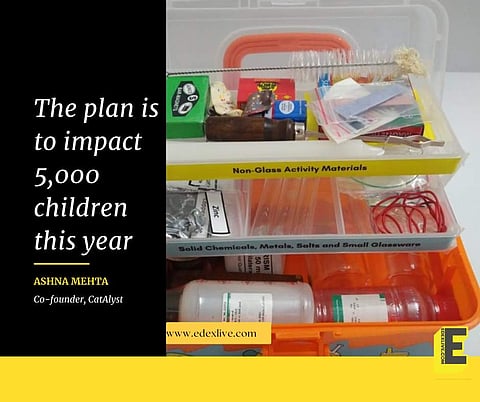

Difficult, boring and scary — that's how Ashna Mehta describes the subject of Science. But the quandary began when, as a Teach For India Fellow in June 2018, she had to teach Science to students of classes VIII, IX and X. "Here was another batch of students coming years after me and yet my feelings about the subject were the same as when I was their age," muses the 24-year-old. So after multiple conversations with students, she decided that the classes needed a simple intervention — getting basic Science models and experiments to the classroom. This idea has since turned into a much more evolved start-up called CatAlyst that has been incubated at InnovatED, Teach For India's nine-month-long incubator programme.
Let’s spark some joy
It all started with simple experiments like the golden rain demonstration and filtration technique. Slowly, the Hyderabadi started adding more and more experiments and, proportionally, saw more results. "I could see that children started taking an interest in classes and their retention also improved. It gave so much space for all types of learners — kinesthetic, visual or auditory. But the main difference was seen in the slow learners," says Ashna who noted these changes in the 180 children she was catering to. Soon, she joined forces with Nayeem Sarang (27), another Teach For India Fellow, and came up with curriculum-specific Science kits that aligned perfectly with the state's syllabus. This kit offers a treasure trove of Science experiments, initially distributed to 18 teachers across the city. This was after the duo signed up for Teach For India's Be The Change project which allows second-year Fellows to take their projects to the next level. This also ensured that the project would not end after the fellowship.
Talking elaborately about the kit, Ashna informs that the Science textbook assigned by the state contains 40 experiments that the teachers are supposed to carry out. "This kit equips them to perform all of these 40 experiments and gives them the scope to perform a few more too," explains the youngster. Currently, they are offering the kits on a rental model and by the end of the year, the school can send back the equipment while the chemicals and the perishable components will be replenished as and when needed. It will cost the school Rs 500 to Rs 800 to rent one kit for a year. "The training that we offer along with these goes a long way in making teachers more confident with their subjects," she points out. Refraction and reflection, chemical reactions, electricity and many more concepts can be explained more effectively via the experiments from the kit.
Out of the 40 experiments, there are about 20 that can be done by students themselves without adult supervision. This is a fairly recent addition — two months ago to be exact — to what they offer.
Get with the programme now
All in all, CatAlyst runs two programmes. The first one, SPARK Classroom, equips teachers with these year-long kits. The duo also trains them in hands-on experimentation as well as takes monthly sessions to keep them up-to-date. Currently, 15 teachers are making the most of this. Then there is Curiosity Hour, which is the start-up's earnest attempt to increase scientific literacy by conducting workshops on various topics that might not necessarily fall within the ambit of their curriculum but will still spark much joy.
The pandemic handicapped the operations of CatAlyst, so they carried the experiments out online. But now that schools are reopening, they are raring to go. "We were aiming for a hands-on learning module but the pandemic demanded a more hands-off approach. Keeping in mind the restraints of internet connectivity and device availability among children, we tried to upload videos of the experiments on YouTube so that they can watch it when they have the chance," says Ashna. They have even started creating awareness about lesser-known Science related careers, like lab technician, with the help of a local organisation called Vocatio that helps with counselling. This was solely on social media, but this year, they plan to take it beyond.
Last year, CatAlyst was pre-incubated at InnovatED and they are happy to take their association with the incubator further. They have been working with affordable private schools till now and hope to work with government schools as well. "The plan is to impact at least 5,000 children this year," says Ashna with dreams sparkling in her eyes.
